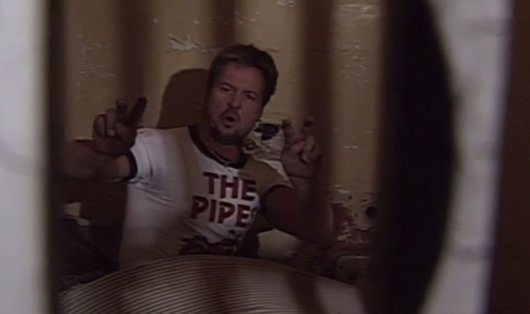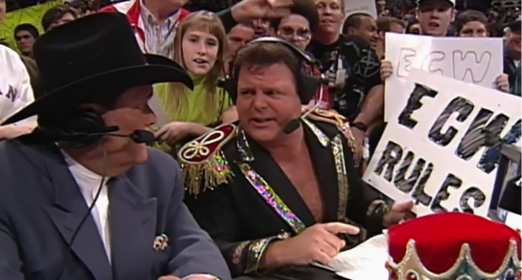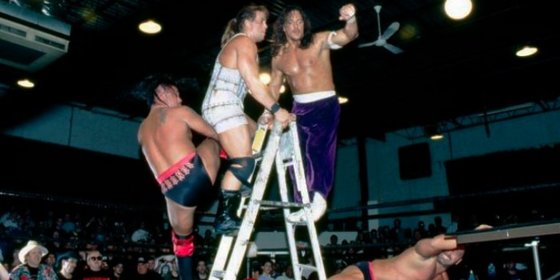Subscribe to the podcast via: iTunes | RSS Feed | Email Newsletter
In 1994 the WWF ran with a main event of Roddy Piper against Jerry Lawler at the King Of The Ring pay per view, ahead of both the King Of The Ring finale and Bret Hart’s first WWF title defence of his reign against Diesel. The match felt hideously out of place at a time when the WWF were simultaneously pushing the idea of the “New Generation”, but save a bit of time on Raw and the match itself it largely didn’t take up much time, and the then 40-year-old Piper disappeared, not to be seen on a wrestling show for another 18 months.
Piper, on his day a tremendous promo, still probably had a place in wrestling in the 1990s – but the demands for him as an in-ring act were pretty low. When the WWF bought him back at the beginning of 1996 to fill in for President Gorilla Monsoon his role was exactly that – delivering a barmy promo while they were building a cage on February’s pay per view, then playing mediator between the jarringly respectful Shawn Michaels and Bret Hart ahead of their match at Wrestlemania. Following the suspension of Razor Ramon, Piper was bought onto the Wrestlemania card to oppose Goldust in a crazy match that involved a car chase and Goldust being stripped down to a full set of women’s underwear before he won the match. Once again, after the match Piper basically disappeared.
It was all indicative of someone who was quite content with his place in the wrestling world. In the aftermath of Hulk Hogan’s arrival in WCW two years prior, Vince McMahon amidst his disappointment had spoken of his desire for Hogan to become the WWF’s Babe Ruth. I’m not well versed enough in Baseball to stretch that analogy much further, but Piper certainly would’ve fit into the category of a legendary main eventer that could be bought back sparingly as a special attraction. But, as had slowly been coming a pattern recently, money was beginning to talk, and loyalty was beginning to mean less and less if the price from Altanta was right. Within weeks of Mr Perfect walking out on the WWF mid-angle to sign a deal with WCW, Piper followed.
Piper’s arrival was a surprise to just about everyone, walking out at the conclusion of the Halloween Havoc pay per view, after the NWO had dispatched of Randy Savage in an angle so decisive that it was designed, if need be, to write Savage off permanently if he didn’t sign a new contract. The promo – designed to begin the setup for Hogan vs Piper – went so long the show actually went off the air before they'd finished. Piper’s digs at Hogan were that Piper was just as important as Hogan was during the boom, even going as far to name-check Wrestlemania. Quite where the angle was supposed to finish it’s not sure, but despite Hogan’s efforts to hurry things along it just fizzled out as we ran out of time.
Piper’s arrival came at an interesting time for WCW. In the midst of what could only be described as a “growing” phase of the NWO angle. As the group expanded from three at the end of August to a dozen by the end of November – the WCW had really struggled to find any kind of opposition as the New World Order dominated proceedings. With Savage gone, Flair injured and Sting undergoing a change of character initially designed to write him off so he could tape a movie and miss some dates to rebalance his contractual obligations – there wasn’t really an opposition to speak of. And Roddy Piper had no real plans of changing that.
But, as much as I wanted to hate the angle, to hate WCW's misuse of resources (time on television, money and the guys who – full time – could be put in this spot), it really was hard to dislike Piper. His character on TV was honest, funny, and believable in an era still dominated by larger than life personas. Piper didn't align himself with WCW not, necessarily, because WCW sucked (although there was the implication) but because he didn't need anyone else. Even in the face of an NWO onslaught Piper never cried for help – he took his beating and came back from every one of them.
It also helped that Piper was presented as and reacted to like the star he was. The announcers talked about him... constantly – every segment, every match the talk was about what Piper might do next, or how he might react to the previous actions of the NWO. Piper seemed bigger than everyone else, in the same way that Sting was walking around in his own universe so was Piper. It helped both of them get over, almost as if neither was guilty by association with what was left of WCW which, given that the Horsemen were busy occupied with themselves, seemed to be being spearheaded by Jim Duggan, of all people.
Piper's arrival also preceded the heel turn of Eric Bischoff. It should be said that there's very little argument to suggest the turn was completely bungled: from how it was executed (randomly at the end of a Nitro with very little fan fare), to the absence of logic (how Bischoff had been the primary target of the NWO for months), to the justification behind it (Bischoff had something hot and wanted to be a part of it). But, even with all that in mind, it cannot be argued that Bischoff very, very quickly became accustomed to the role and thanks to his seniority on and off screen quickly became one of the best acts within a group that was quickly losing its edge.
The NWO had gone from a renegade group of three guys to a bloated assembly of a mixed part of WCW's overall roster. The idea was to create NWO as a brand, and despite all of the flaws of that idea there could be no denying that, on a scale WCW wanted, the group had to expand. First it was the Giant (a big, if ultimately flawed turn), then it was fake Sting – which worked for the angle it was built for then quickly became a complete irrelevance. Then Syxx, then Nascar driver Kyle Petty – soon the group was in double figures. When Bischoff declared war on WCW, and gave everyone four weeks to "convert your WCW contracts into NWO ones", then Bagwell turned, then Bubba joined, then Scott Norton joined, then VK Wallstreet joined. All of a sudden being in the NWO wasn't cool anymore, unless your name was Hall or Nash.
Piper was largely shielded from all of that, mind. There was a segment during the World War 3 pay per view (which had enough NWO problems as it was) where Piper's horrid looking scar from hip surgery was exposed as they made formal him vs World Champion Hogan at Starrcade five weeks later. Another huge beatdown on Piper who had no allies (he didn't ask for them) and kept getting back up (what doesn't kill him...) - Piper was a fucking badass, regardless of the rights and wrongs of how he was presented. And, come Starrcade, there was a real belief he could topple the World Champ.
You'll notice I keep referring to Hogan as the World Champion – he was, that's not the issue, but you would've blindly assumed that any Piper vs Hogan match at WCW's biggest show of the year (in whas was being called "The Match Of the Decade" no less) would be for WCW's (or the NWO's) biggest prize. While WCW could correctly argue they never outright said it, the implication of the matchup was that Piper vs Hogan was for the title... but it wasn't.
Which, of course, meant that Piper could beat Hogan – which he did. The crowd suitably popped for what should’ve been a title change and a match between two guys long past their best (and wrestled like it too) got through unscathed thanks to the tenure of both guys and, to WCW’s credit, how hard they’d promoted the match. But the problem with promoting a big match is that for it to matter or, more importantly, the next one to matter, it needs big consequences. And while the big mistake WCW made was not promoting a match of such magnitude without the biggest title on the line, it was followed by something perhaps even worse.
The next night on Nitro they had Bischoff and Hogan come out and pretend that Hogan won – straight up. And while you might think that delusional heel isn’t exactly the worst trait, the big mistake in the context was them not being called out on their bullshit. Or, at least, not doing it to anywhere near the degree that they should’ve. Art imitating life, people were scared to stand-up to Bischoff and Hogan, treated the match and the result like it didn't matter. And it *did matter* - Starrcade did just under 380,000 buys, Nitro the next evening did a 3.6 rating – most of those people didn't see the pay per view.
And for a while that was it, Piper went away while WCW started (sorta) promoting and NWO-only pay per view and Hogan, Bischoff and everyone else went on like Roddy Piper wasn't the World Champion in all but name.
Of course, though, this is Hulk Hogan, and whether he was saying it or not Hulk Hogan the person knew that - as they were building in the storyline prior to the Starrcade match – he still hadn't beaten Roddy Piper. Whether they were saying it or not, the record books would ultimately read Roddy Piper def. Hulk Hogan – and much like they would later do with The Ultimate Warrior and would attempt to do with Yokozuna – Hulk Hogan wanted all of his wins back.
Which set the stage for the rematch. It was announced that Hogan and Piper would face-off at Superbrawl in February for the World Title. Except Piper didn't want to, he arrived with his child Colton in tow, to announce his retirement from in ring competition. The whole thing, somewhat hokey, went with Bischoff and Hogan goading Piper before Colton gave Piper the all clear to go after Hogan, Bischoff and the World Title.
The promos continued to make little sense, hell – on the Nitro before the pay per view they filmed a promo of his in an actual cell inside Alcatraz (the PPV was in San Francisco). Piper lurched between once extreme and another, promising to spend seven days and seven nights inside the Rock before the match, "I'm not here to create the world, I'm hear to destroy Hulkamania".
And that's how the pay per view started, Piper being lead out of the prison, charging across the courtyard and getting a boat headed for shore. It perhaps could've only been topped had Piper got into a raft he'd made himself out of rain jackets, but still it was a cool if bat-shit crazy way to open the pay per view. Quite frankly, if there was a line about Piper's run in WCW up until this stage the line "cool if bat-shit crazy" would probably sum it up.
The match, much like the last one, was pretty predictable. Once again the crowd were invested, once again the action was pretty ropey – that didn't matter though. This time the match came to an end with Randy Savage (decked out in black and white) stood at ringside while Piper once again locked in the sleeper hold. Hogan once again collapsed. Hogan once again passed out. Piper, once again, won. Piper, once again, was champion.
Once again – he wasn't. This one was for the title, but in the annals of fucked finishes, having Randy Savage retrospectively pull Hogan's legs under the bottom ropes ranks as a weak finish in anyone's books. The pop for Piper's win was huge, but Savage's actions so subtle and the angle so swift that it caught every by surprise. In theory, Savage's turn should've been a huge deal but in a slight of hand WCW had, well, overplayed theirs. The ref spotted his "error", restarted the match before Hogan nailed Piper with the knucks that Savage gave him and won the match.
1996-1997 would be known as time that WCW could do no wrong – and in a lot of ways that was correct. But WCW's lax, lazy attitude to match stipulations and following through on promises would ultimately harm them in the long term. But despite all the reservations you might have about Piper's return, his first 4-5 months with the company were excellent.



 RSS Feed
RSS Feed